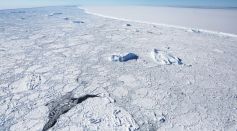ENVIRONMENT & CLIMATE

Humble Little Legless Maggots Dubbed Superhero Insect for Helping Humans Solve Murders, Cleaning Chronic Wounds

Mass Migration During Bronze Age Found Responsible for Replacing Half of Great Britain's Ancestry; France Tops Genetic Evidence of Migrants 3,000 Years Ago

Large Hole Created in the Ozone Layer More Massive Than Antarctica Finally Set to Close This Week

Real-Life Jurassic Park Possible? Experts Say Dinosaurs Can Be Recreated From Their DNA

Iridescent Shimmer of Peacocks and Hummingbirds Has Complex Nanostructures At Play, According to Scientists

Black Tigers: Scientists Uncover the Secrets Behind the Genetic Mutants' Unique Stripes

Arctic Blue Christmas: Light Show Found on Snows in the White Sea Discovered as Effect of These Organisms

Brutal Blood Eagle Ritual from Viking Legends Is Anatomically Possible, Result to Immediate Death

326-Million-Year-Old Car-Sized Millipede Is The World's Largest Arthropod, Study Says

Rare 130-Million Year Old Dinosaur Fossil Egg With Curled Up Embryo Similar to Unhatched Chickens Still Complete Inside Shell

Europe's Most Famous Mummy: How is Ötzi the Iceman 30 Years After His Discovery?

Total Darkness, Thriving Ecosystem Beneath Antarctic Ice Shelf That Existed 6,000 Years Found

Himalayan Glaciers Lost 10 Times Ice In the Last Few Decades, Exceptional Melting Rate A Threat to Asian Water Supply








